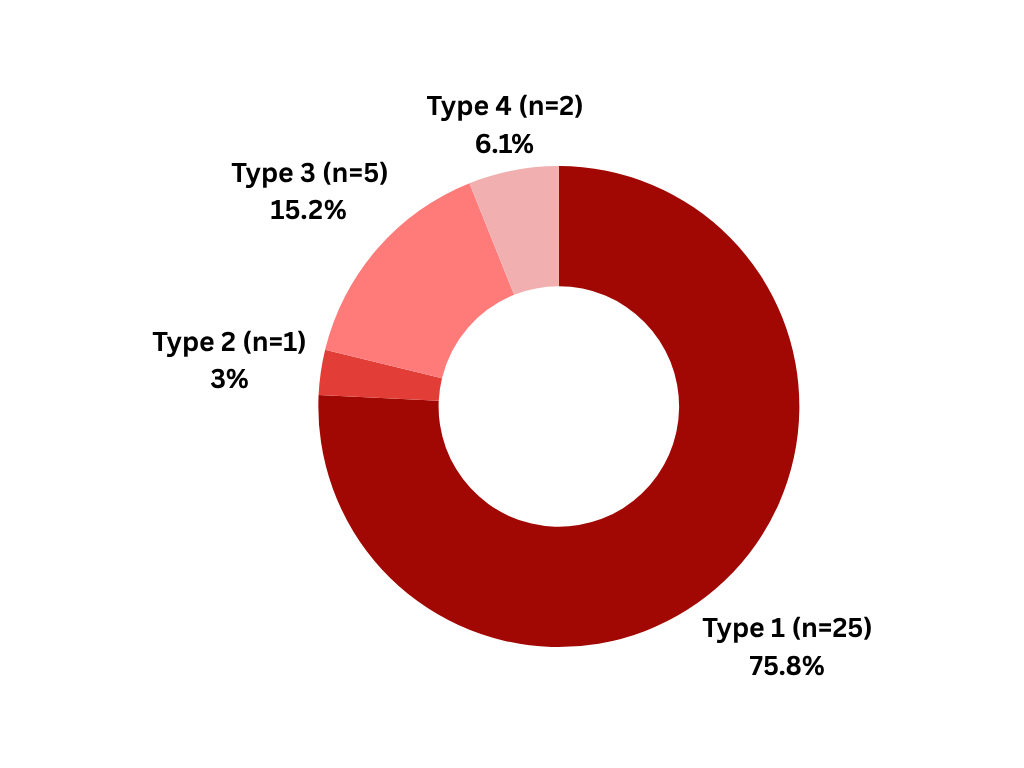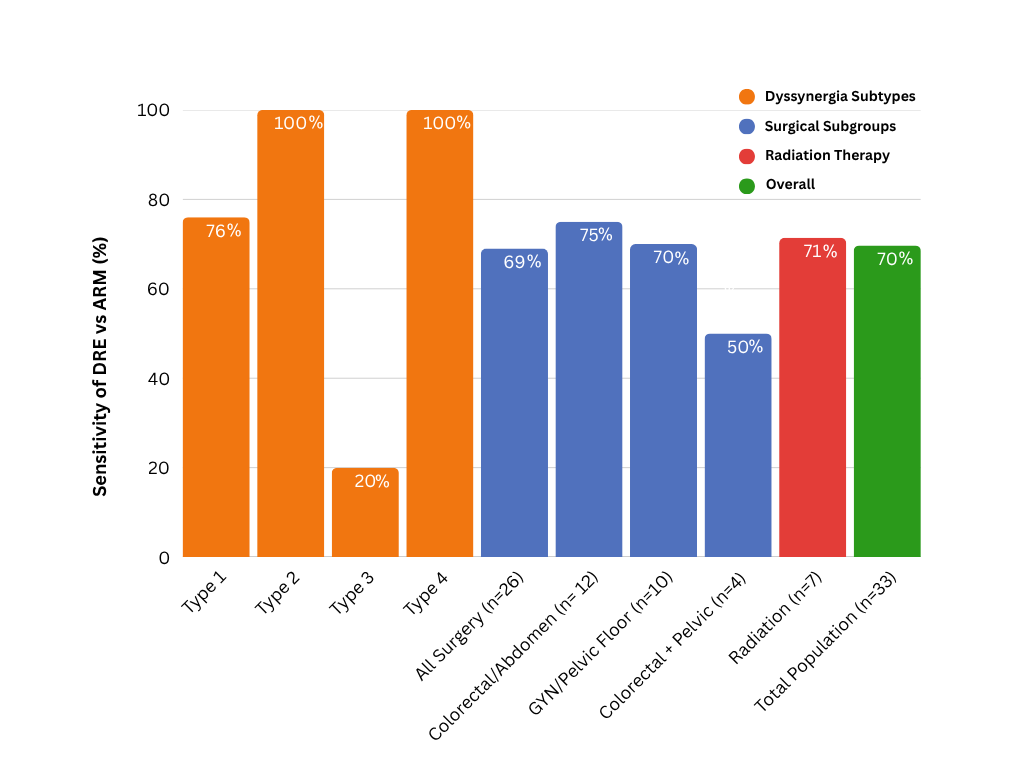Tuesday Poster Session
Category: Colon
P4553 - Utility of DRE in Cancer Patients: Has It Lost Its Touch?
Tuesday, October 28, 2025
10:30 AM - 4:00 PM PDT
Location: Exhibit Hall

Anni Chowdhury Arellanes, DO
MD Anderson Cancer Center
Houston, TX
Presenting Author(s)
Anni Chowdhury Arellanes, DO1, Chioma Owo, MD2, Lavanya Viswanathan, MD, MS, FACG3
1MD Anderson Cancer Center, Houston, TX; 2University of Texas Health San Antonio, San Antonio, TX; 3UT MD Anderson Cancer Center, Houston, TX
Introduction: Digital rectal exam (DRE) is highly sensitive in identifying dyssynergic defecation (DD) in patients with constipation. However, its accuracy has not been determined in cancer patients, in whom it is possible that interventions such as pelvic radiation or lower GI surgeries may render DRE less reliable due to potential sensory and anatomic changes. This study aims to investigate the diagnostic yield of DRE in patients receiving care at a tertiary cancer center with a history of pelvic radiation or cancer-related lower abdominal surgeries who have undergone anorectal manometry (ARM).
Methods: We conducted a single-center, retrospective review of adult patients referred to the GI motility clinic for bowel complaints between July 2024 and May 2025. Among all the pts referred for constipation (eg: straining, incomplete evacuation, splinting), fecal incontinence, or rectal pain, 33 had relevant abdominopelvic cancer history and were treated with pelvic radiation, lower abdominal surgery, or both as part of their cancer therapy (Table 1).
Results: 33 pts (23F/10M) with mean age of 63y were included in our analysis. 25 (75%) had constipation and 7(21%) presented with fecal incontinence. DRE was abnormal in 92% of pts with constipation and 85.7% of pts with fecal incontinence. All 33 were subsequently confirmed to have DD on ARM. DRE demonstrated a sensitivity of 90.9% in detecting DD in this cohort with a PPV of 87% & sensitivity of 69.7% for accurately classifying the DD subtype. Distribution of DD subtypes is described in Figure 1. Sensitivity within subgroups was 71% for those with prior radiation and 67% for those with cancer-related surgery. Additional subgroup analysis is presented in Figure 2.
Discussion: Our study demonstrates that DRE is 90% sensitive in detecting DD in our cancer patient cohort with decreasing sensitivity in pts with history of radiation (69.7%), any one type of abdominopelvic surgery (67%) and more than two different abdominal surgeries (50%). DRE had a PPV of 87% in diagnosis of DD in our study. While DRE should be part of the standard outpatient investigation for bowel complaints in cancer patients, this study supports referring for ARM even when DRE is normal in order to avoid missing the diagnosis of DD especially in those receiving abdominopelvic radiation/surgery. Further research with a larger sample size can further validate these findings and evaluate the utilization of low-cost interventions such as DRE to guide the need for confirmatory testing with ARM.

Figure: Figure 1: Distribution of dyssynergia subtypes among all patients (N = 33), with Type 1 comprising the majority (75.8%).

Figure: Figure 2: Sensitivity of DRE compared to ARM across dyssynergia subtypes (Type 1 to Type 4) and the following 4 subgroups: 1. All patients who received cancer related abdominopelvic surgery, 2. patients with colorectal & abdominal surgery (including proctocolectomy, low anterior resection, partial colon resections, exploratory laparoscopy, abdominal reconstruction and nephrectomy), 2. Gynecologic and pelvic surgeries (including hysterectomy, oophorectomy, bladder suspension, cystocele/rectocele repair, prostatectomy, and TURP) and patients with both types of surgeries. Patients who had surgery in addition to radiation were only included in the radiation group. DRE performed best in identifying Type 1 DD, with markedly lower sensitivity for Type 3. Among surgical groups, sensitivity of DRE was highest in colorectal and abdominal surgery (75%) and lowest in patients with multiple types of surgery.
Disclosures:
Anni Chowdhury Arellanes indicated no relevant financial relationships.
Chioma Owo indicated no relevant financial relationships.
Lavanya Viswanathan: Ardelyx, Inc. – Advisor or Review Panel Member, The above are unpaid., Speakers Bureau.
Anni Chowdhury Arellanes, DO1, Chioma Owo, MD2, Lavanya Viswanathan, MD, MS, FACG3. P4553 - Utility of DRE in Cancer Patients: Has It Lost Its Touch?, ACG 2025 Annual Scientific Meeting Abstracts. Phoenix, AZ: American College of Gastroenterology.
1MD Anderson Cancer Center, Houston, TX; 2University of Texas Health San Antonio, San Antonio, TX; 3UT MD Anderson Cancer Center, Houston, TX
Introduction: Digital rectal exam (DRE) is highly sensitive in identifying dyssynergic defecation (DD) in patients with constipation. However, its accuracy has not been determined in cancer patients, in whom it is possible that interventions such as pelvic radiation or lower GI surgeries may render DRE less reliable due to potential sensory and anatomic changes. This study aims to investigate the diagnostic yield of DRE in patients receiving care at a tertiary cancer center with a history of pelvic radiation or cancer-related lower abdominal surgeries who have undergone anorectal manometry (ARM).
Methods: We conducted a single-center, retrospective review of adult patients referred to the GI motility clinic for bowel complaints between July 2024 and May 2025. Among all the pts referred for constipation (eg: straining, incomplete evacuation, splinting), fecal incontinence, or rectal pain, 33 had relevant abdominopelvic cancer history and were treated with pelvic radiation, lower abdominal surgery, or both as part of their cancer therapy (Table 1).
Results: 33 pts (23F/10M) with mean age of 63y were included in our analysis. 25 (75%) had constipation and 7(21%) presented with fecal incontinence. DRE was abnormal in 92% of pts with constipation and 85.7% of pts with fecal incontinence. All 33 were subsequently confirmed to have DD on ARM. DRE demonstrated a sensitivity of 90.9% in detecting DD in this cohort with a PPV of 87% & sensitivity of 69.7% for accurately classifying the DD subtype. Distribution of DD subtypes is described in Figure 1. Sensitivity within subgroups was 71% for those with prior radiation and 67% for those with cancer-related surgery. Additional subgroup analysis is presented in Figure 2.
Discussion: Our study demonstrates that DRE is 90% sensitive in detecting DD in our cancer patient cohort with decreasing sensitivity in pts with history of radiation (69.7%), any one type of abdominopelvic surgery (67%) and more than two different abdominal surgeries (50%). DRE had a PPV of 87% in diagnosis of DD in our study. While DRE should be part of the standard outpatient investigation for bowel complaints in cancer patients, this study supports referring for ARM even when DRE is normal in order to avoid missing the diagnosis of DD especially in those receiving abdominopelvic radiation/surgery. Further research with a larger sample size can further validate these findings and evaluate the utilization of low-cost interventions such as DRE to guide the need for confirmatory testing with ARM.

Figure: Figure 1: Distribution of dyssynergia subtypes among all patients (N = 33), with Type 1 comprising the majority (75.8%).

Figure: Figure 2: Sensitivity of DRE compared to ARM across dyssynergia subtypes (Type 1 to Type 4) and the following 4 subgroups: 1. All patients who received cancer related abdominopelvic surgery, 2. patients with colorectal & abdominal surgery (including proctocolectomy, low anterior resection, partial colon resections, exploratory laparoscopy, abdominal reconstruction and nephrectomy), 2. Gynecologic and pelvic surgeries (including hysterectomy, oophorectomy, bladder suspension, cystocele/rectocele repair, prostatectomy, and TURP) and patients with both types of surgeries. Patients who had surgery in addition to radiation were only included in the radiation group. DRE performed best in identifying Type 1 DD, with markedly lower sensitivity for Type 3. Among surgical groups, sensitivity of DRE was highest in colorectal and abdominal surgery (75%) and lowest in patients with multiple types of surgery.
Disclosures:
Anni Chowdhury Arellanes indicated no relevant financial relationships.
Chioma Owo indicated no relevant financial relationships.
Lavanya Viswanathan: Ardelyx, Inc. – Advisor or Review Panel Member, The above are unpaid., Speakers Bureau.
Anni Chowdhury Arellanes, DO1, Chioma Owo, MD2, Lavanya Viswanathan, MD, MS, FACG3. P4553 - Utility of DRE in Cancer Patients: Has It Lost Its Touch?, ACG 2025 Annual Scientific Meeting Abstracts. Phoenix, AZ: American College of Gastroenterology.
